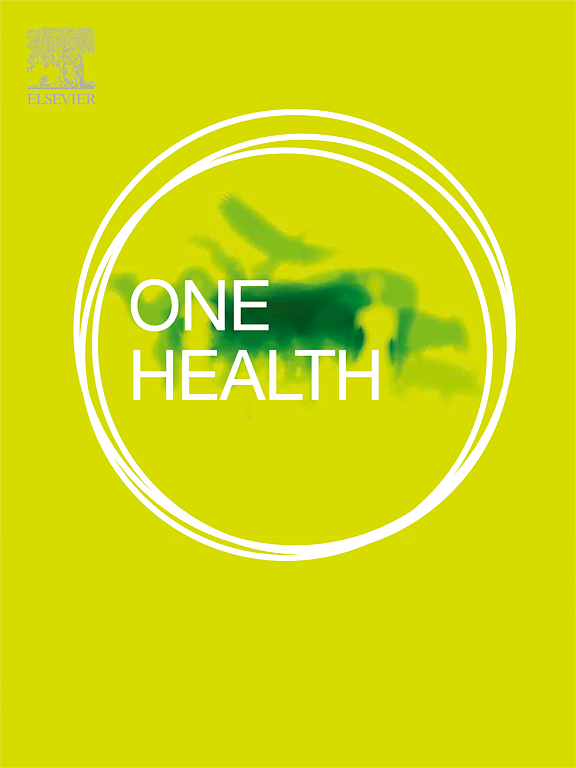采用混合方法确定尼日利亚人类和动物卫生部门抗菌素耐药性干预领域的优先次序
IF 4.1
2区 医学
Q1 INFECTIOUS DISEASES
引用次数: 0
摘要
“同一个健康”方针对于确定应对抗菌素耐药性的干预领域的优先次序至关重要。本研究旨在确定和评估尼日利亚人类和动物卫生部门的关键驱动因素和抗菌剂管理(AMS)挑战。尼日利亚的人类(22人)和动物(33人)卫生专业人员通过在线问卷被要求对主题专家确定的优先病原体、AMS挑战和AMR驱动因素进行排名。描述性统计和费雪精确检验用于评估部门之间排名的差异。随后,对同行评议研究和灰色文献进行了范围文献综述,以评估支持排名的证据。沙门氏菌(28.5%)和大肠杆菌(28.2%)是AMR的优先病原菌。Fisher精确检验显示,职业与沙门氏菌排名之间存在显著关联(p = 0.049),动物卫生专业人员对沙门氏菌的排名高于人类卫生专业人员。在人类和动物卫生部门,AMS面临的优先挑战是“易于获得非处方抗微生物药物”(分别为14.9%和20.1%)和“缺乏对AMR/AMS的认识”(分别为14.1%和20.4%)。“缺乏感染预防和控制(IPC)”(24.5%)是各部门中排名最高的抗生素耐药性驱动因素。人类和动物卫生专业人员对获得兽医专业知识这一挑战的排名存在差异(p = 0.011),因为医生对这一挑战的排名高于兽医。医生对“缺少IPC”(p = 0.022)和“环境退化”(p = 0.048)的评价高于兽医。相反,在兽医中,“屠宰场不卫生的过程”排名较高(p = 0.032)。在审查的84篇文章中,62篇文章支持两个部门的AMS挑战排名,24篇文章描述了相关的AMR驱动因素。我们的研究结果强调了尼日利亚需要一个健康的方法来改善AMS和遏制AMR。本文章由计算机程序翻译,如有差异,请以英文原文为准。
Prioritising intervention areas for antimicrobial resistance in Nigeria's human and animal health sectors using a mixed-methods approach
A One Health approach is essential to prioritise intervention areas to tackle antimicrobial resistance (AMR). This study aimed to identify and evaluate critical drivers and antimicrobial stewardship (AMS) challenges within Nigeria's human and animal health sectors.
Human (22) and animal (33) health professionals in Nigeria were asked via an online questionnaire to rank priority pathogens, AMS challenges, and AMR drivers identified by subject matter experts. Descriptive statistics and the Fisher's exact test were used to evaluate differences in rankings between sectors. Subsequently, a scoping literature review of peer-reviewed research and grey literature was conducted to evaluate the evidence supporting the rankings.
Salmonella spp. (28.5 %) and Escherichia coli (28.2 %) were selected as the top-ranked priority pathogens for AMR. The Fisher's exact test showed a significant association (p = 0.049) between profession and ranking of Salmonella, which was ranked higher by animal health professionals than their human health counterparts. Priority AMS challenges in both human and animal health sectors were “ease of access to over-the-counter antimicrobials” (14.9 % and 20.1 %, respectively) and “lack of awareness of AMR/AMS” (14.1 % and 20.4 %, respectively). “Lack of infection prevention and control (IPC)” (24.5 %) was the highest-ranked AMR driver across sectors. Differences were observed between the rankings human and animal health professionals gave to the challenge of access to veterinary expertise (p = 0.011), as medical doctors ranked this component higher than veterinarians. “Lack of IPC” (p = 0.022) and “environmental degradation” (p = 0.048) were ranked higher by medical doctors than veterinarians. Conversely, “unsanitary processes in the abattoir(s)” was ranked higher among veterinarians (p = 0.032). Of the 84 articles reviewed, 62 supported the rankings of AMS challenges in both sectors, while 24 captured relevant AMR drivers.
Our findings underscore the need for a One Health approach in Nigeria to improve AMS and curb AMR.
求助全文
通过发布文献求助,成功后即可免费获取论文全文。
去求助
来源期刊

One Health
Medicine-Infectious Diseases
CiteScore
8.10
自引率
4.00%
发文量
95
审稿时长
18 weeks
期刊介绍:
One Health - a Gold Open Access journal.
The mission of One Health is to provide a platform for rapid communication of high quality scientific knowledge on inter- and intra-species pathogen transmission, bringing together leading experts in virology, bacteriology, parasitology, mycology, vectors and vector-borne diseases, tropical health, veterinary sciences, pathology, immunology, food safety, mathematical modelling, epidemiology, public health research and emergency preparedness. As a Gold Open Access journal, a fee is payable on acceptance of the paper. Please see the Guide for Authors for more information.
Submissions to the following categories are welcome:
Virology,
Bacteriology,
Parasitology,
Mycology,
Vectors and vector-borne diseases,
Co-infections and co-morbidities,
Disease spatial surveillance,
Modelling,
Tropical Health,
Discovery,
Ecosystem Health,
Public Health.
 求助内容:
求助内容: 应助结果提醒方式:
应助结果提醒方式:


